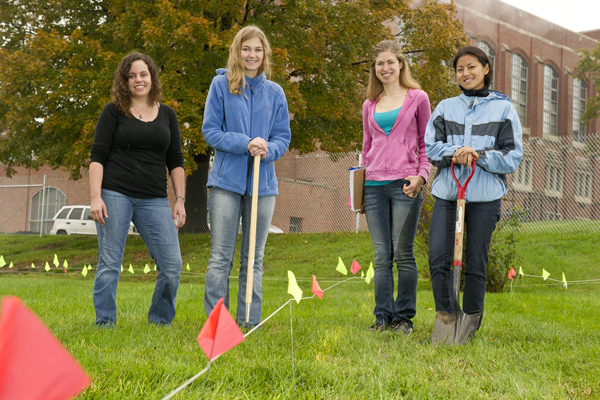October 31, 2011
Sowing the seeds of community
New 4,000-square-foot garden welcomes JHU affiliates and neighbors

Plotting the plan for the community garden project on the Johns Hopkins at Eastern campus are Audrey Swanenberg, Anna Belous, Raychel Santo and Wei-ting Chen. Photo: Will Kirk/Homewoodphoto.jhu.edu
A community garden will take root this fall on the Johns Hopkins at Eastern campus, thanks to the nurturing efforts of a small group of students and the support of several university offices.
The garden was the idea of representatives from Real Food Hopkins, a student-run group committed to bringing local, sustainable, humane and fair food to the Homewood campus and the surrounding Baltimore area.
The group had been cultivating a small garden behind 3105 N. Charles St. but learned that they could no longer use the site (though it’s since been reinstated).
The students viewed the loss as an opportunity to create a bigger garden that could serve as a model for urban gardening and sustainable agriculture for both the community and Johns Hopkins affiliates.
The hunt for a new site began.
Real Food Hopkins, working with the university’s Office of Facilities Management, identified a roughly 4,000-square-foot triangular patch of grass adjacent to the running track at Johns Hopkins at Eastern.
The effort received additional support from the university’s Sustainability Office, the Center for Social Concern, the Office of Government and Community Affairs, and Campus Kitchen at Johns Hopkins University.
Students, staff and faculty will be able to sign up to garden their own individual plots or to work with a Waverly neighborhood community group, beginning next spring. The site offers space for more than 50 five-by-eight-foot plots, and student leaders anticipate that 15 to 20 will be established and actively maintained in the first growing season.
To promote the new endeavor, a town hall meeting will be held from 6 to 7:30 p.m. on Thursday, Nov. 3, in the Training and Development room at Johns Hopkins at Eastern. Participants can learn about the new community garden, sign up for garden plots, help name the garden and offer input on its future use.
Wei-ting Chen, a fourth-year doctoral student in the Department of Sociology and one of the garden’s champions, said that the students wanted Johns Hopkins to participate in the growing sustainable food production movement, and strengthen the university’s relationship with residents and community organizations in the Waverly neighborhood.
“We can see people from Johns Hopkins working side by side with residents in the garden,” she said. “The garden has an educational component, too, where people can learn about food production and sustainability.”
Joanna Calabrese, a sustainability outreach coordinator for Johns Hopkins, said that the garden promises great success, thanks to the students’ vision and hard work.
“The student leaders of this project have demonstrated the potential for young leaders. They realized the potential of the urban agriculture movement to vitalize and strengthen our community,” she said. “Johns Hopkins University has the resources and opportunity to play a unique and meaningful role in Baltimore City’s own movement. Both JHU and Waverly community gardeners will benefit from greater access to healthy, nutritious food.”
In addition to Chen, the student leaders of the community garden are Raychel Santo, a sophomore double major in public health studies and global environmental change and sustainability and president of Real Food Hopkins; Audrey Swanenberg, a senior sociology major; and freshman Anna Belous.
Chen said that the group expects the garden’s users to plant squash, tomatoes, herbs, beans and other vegetables. The students have already planted some garlic and perennial flowers, and expect to plant some fruit trees.
The plot managers can keep what they produce as well as donate a portion of the crops to Campus Kitchen at Johns Hopkins, which is dedicated to using surplus food to provide balanced and nutritious meals for hungry men, women and children in the Baltimore area.
The Office of Facilities Management has agreed to provide further assistance in the form of fencing, landscaping and the creation of the raised beds. Facilities and the students will also secure tools, such as shovels and cultivators, to be shared among the garden users.
Karen Geary, senior property manager with the Office of Facilities Management, said that her office was happy to work with this group of motivated students on such a worthwhile project.
“And we think this is a great space. It’s large and visible, with direct access to water and 24-hour security,” Geary said. “The students view this as a long-term, viable project that can continue well after they graduate.”
Santo said that she hopes the garden can create a long-lasting community of students, staff, faculty and neighborhood members devoted to learning about and growing healthy food together.
“The idea is that it won’t be just a few individuals bearing the weight of the gardening but really a cooperative effort to show that we all care about our food and where it comes from,” Santo said.
Johns Hopkins also has partnered with the University of Maryland Extension’s master gardener program to provide training and green tips.
The students will update progress on the garden at jhucommunitygarden.wordpress.com.
For more information, email jhucommgarden@gmail.com.

